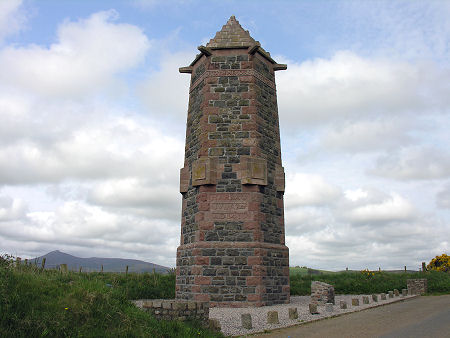 Memorial to the Battle of Harlaw |
Donald (or Domhnall) of Islay lived from 1350 to 1423. He was the second of four "Lords of the Isles" and succeeded his father, John of Islay. Despite being Robert II's grandson, Donald is remembered for increasing levels of conflict with other members of the Stewart family over the rights to the Earldom of Ross, culminating in the savage Battle of Harlaw. The wider picture in Scotland at the time is set out in our Historical Timeline.
Donald inherited his father's titles in 1387 and spent the early years of his tenure suppressing a revolt by his younger brother John Mór who, with the support of the Macleans, was trying to expand on his small inheritance of lands. By 1395 Donald had driven John Mór into exile in Ireland and beaten off the challenge of the Macleans.
Donald was then able to turn his attention to the more serious problem facing him. The Stewarts were very effective producers of offspring, both legitimate and illegitimate, and this meant that the family consumed more and more territory as one after another of Robert II's children were granted titles and associated lands. As a major landowner, and despite being Robert II's grandson, Donald would have seen this as a growing threat.
Matters came to a head over the Earldom of Ross, which controlled a vast swathe of northern Scotland extending from the Isle of Skye to Inverness, and therefore extended right along the northern flank of Donald's territories. Partly to secure his northern flank, Donald had married Mariota Leslie, sister of Alexander Leslie, the Earl of Ross. But when Alexander died in 1402, Mariota's claim to the Earldom was overlooked in favour Alexander Leslie's sickly young daughter, Euphemia.
By now control of Scotland was nominally in the hands of Donald's cousin, Robert III, who succeeded to the throne in 1390. He was a deeply ineffective King, and the real power lay in the hands of his ruthless and ambitious younger brother, Robert, Duke of Albany. As soon as the young Euphemia inherited the Earldom of Ross, Robert, Duke of Albany, who was the girl's grandfather, took control of her and assumed the title of "Lord of the Ward of Ross": clearly a step en route to taking over the title in its entirety.
Robert, Duke of Albany assumed personal control of Scotland on the death of Robert III in 1406 as the latter's son, 12 year-old James I, was a prisoner in England, where he would remain until 1424. Donald responded by exchanging messages with both James I in captivity and with Henry IV of England, presumably seeking their support in an attack on Robert, Duke of Albany.
In Summer 1411 Donald, Lord of the Isles, gathered an army of 10,000 men including MacIntoshes, Macleans, Macleods, Camerons and Chattans as well as MacDonalds, and took control of the Earldom of Ross by force. He then marched towards Aberdeen where forces were being raised against him by Alexander Stewart, Earl of Mar, a nephew by adoption of Robert, Duke of Albany. The two armies met at the Battle of Harlaw on 24 July 1411, with Donald's 10,000 highlanders being confronted by around 2,000 better equipped men under the Earl of Mar, most of whom were cavalry. At the end of the day's fighting, Donald withdrew, having lost up to 1,000 of his men: compared with the much larger proportionate losses of 600 suffered by the Earl of Mar.
It remains open to debate who, if anyone, "won" the Battle of Harlaw. The person who came out best was not actually present on the day. After Donald withdrew his forces, Robert, Duke of Albany, was able to proclaim the outcome as a triumph for the forces of civilisation over the barbarious highland hordes. He then led an army to retake Ross unopposed. In 1415, he "persuaded" Euphemia to relinquish the Earldom of Ross, which he awarded to his son, John Stewart, the 2nd Earl of Buchan. Euphemia spent the rest of her days in a nunnery.
In 1412, Robert, Duke of Albany followed up his success in Ross with preparations to invade the Lord of the Isles' heartland. He held off doing so after Donald agreed to the terms of the Treaty of Lochgilphead. No details of this remain, but it seems likely that Donald was allowed to keep his existing lands, in return for giving up any claim on the Earldom of Ross.
Robert, Duke of Albany, died in 1420, and Donald, Lord of the Isles, died in 1423. Donald was succeeded his son, Alexander of Islay, who became the third Lord of the Isles. Robert's death cleared the main obstacle to the return of James I from captivity in England, and James assumed the throne in 1424, his first act being to wipe out the surviving Albany Stewarts, one effect of which was to revert the Earldom of Ross to the Crown.
